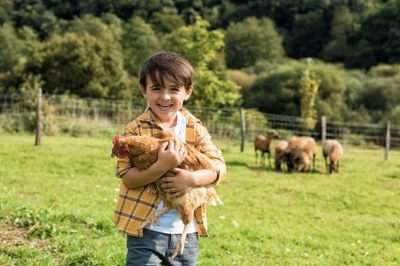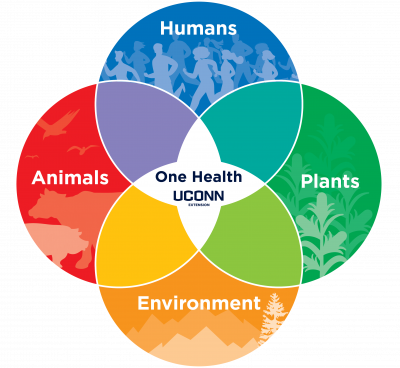UConn Extension One Health
The University of Connecticut Cooperative Extension One Health Program promotes interdisciplinary collaboration to enhance community wellbeing. In applying the One Health framework, we can work to optimize the collective health of humans, animals, plants, and the environment. This program helps community members understand and co-create community-based solutions to modern One Health challenges, such as zoonotic and vector-borne disease concerns, food safety, pollinator health, and more.

Zoonotic Diseases
More than half of all infectious diseases in humans can be spread from animals. These diseases that are able to be spread from animals to humans are called zoonotic diseases. Many can be prevented by learning about safe interactions between humans, animals, and the environment.
Resources for poultry and livestock owners:
Pet Safety
Here are a few things to keep in mind when choosing and handling pets to keep yourself and your family safe by preventing zoonotic diseases:
- Be sure you are choosing the right pet. Consider the needs of the animal along with the ages and immune systems of your family members to ensure it fits the needs of your family. For example, families with children 5 years of age and younger should not have pet reptiles, amphibians, or backyard poultry to prevent exposure to harmful germs. Pregnant women should also avoid contact with pet rodents and cat litter to prevent birth defects as a result of exposure to parasites and viruses.
- Wash your hands. Be sure to wash your hands after handling your pets, pet equipment, pet food, and before eating and drinking to prevent the spread of germs.
- Keep your pet healthy. Regularly bring your pet to the veterinarian for vaccines and for information on flea and tick control. Also be sure to provide your pet with plenty of food, water, opportunities for exercise, and a clean environment.
- You can find more information on pet safety and disease prevention by visiting the "About Pets & People" page on the Centers for Disease Control and Prevention website.
Food Safety
1 in 6 Americans become sick each year from eating contaminated food, so it is important to keep these food safety practices in mind when preparing and consuming foods.
- Wash your hands for 20 seconds before and after touching food. Also wash the surfaces you plan to use and the lids on canned goods when cooking.
- Keep raw meat, poultry, seafood, and eggs separate from all other foods, which includes using a different cutting board for raw foods when cooking.
- Use a food thermometer to be sure the food is cooked to a safe temperature (145 degrees Fahrenheit for beef, pork, lamb, and fish, 160 degrees Fahrenheit for ground beef, pork, and lamb, and 165 degrees Fahrenheit for turkey, chicken, and duck).
- Store food in the fridge or freezer within 2 hours (or 1 hour if it is 90 degrees or hotter outside) after buying groceries or cooking.
- Thaw food by placing it in the fridge, under cold water, or in the microwave.
- You can learn more about food safety by visiting the U.S. Food & Drug Administration "Food Safety at Home" page.

Additional One Health Resources
4-H Youth Education Materials

Michigan State University's Health for One, One Health for All activity explains the topics of One Health in addition to providing directions for a hands-on activity.
